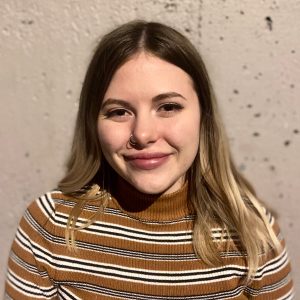
Caroline Lalliss, Student Staff
Studies report that about one-third of college students have experienced physical or sexual violence in an intimate relationship. Disabled people experience intimate partner violence, or IPV, and relationship sexual violence, or RSV at approximately twice the rate of those without a disability. So when disabled students go to college they are at a point in their life where being victimized by an intimate partner is at an all-time high. The risk of experiencing IPV goes up when the person’s disability is more severe.
As a disabled woman, I have wondered why I am more at risk to experience IPV than my non-disabled counterparts? Why are disabled people targeted more than non-disabled people? What about me being disabled makes perpetrators view me as a possible victim? It has only been just over 30 years since over 1,000 disabled people marched from the White House to the Capitol to demand equity, resulting in the passage of the Americans with Disabilities Act of 1990. We know marginalized communities are victimized more often than those who are not marginalized, but why? Are disabled people not valued enough as people? Disabled people have not even been considered people for one hundred years, most people believed in eugenics to stop disabled people from being born, and for those who were born, they were abandoned, killed, or institutionalized. Less than one hundred years is not enough to see a complete turn-around in the way people view disabled people. This relates to relationship and sexual violence because it affects how perpetrators view disabled people, and how people prioritize resources for disabled people.
There are many factors that go into this issue, like ignorance of people with disabilities, stigma, discrimination, insufficient social support, and more. Ignorance that surrounds issues that disabled people face influences the lack of resources and research that is being done to eradicate those issues. The way disabled people experience IPV can also differ from the way non-disabled people may experience IPV. For example, men with a disability have a greater risk to experience stalking and psychological abuse from an intimate partner than non-disabled men. Forms of IPV that disabled people may experience are the restriction of mobility devices, assault while assisting with hygienic activities or getting dressed, denying access to medications, and more. For instance, it can be easy to trap a disabled person if they have certain physical disabilities, and if someone has a medical device attached to their body threats to remove it are also forms of IPV. We need to understand the complexities of what disabled people experience in an IPV situation in order to prevent it.
At the McCluskey Center for Violence Prevention, we are working through an intersectional approach to preventing intimate partner violence and relationship sexual violence through research and engagement of perpetrators. Through this work, we will be able to more deeply understand why disabled people are being disproportionately affected by RSV and IPV.
 Caroline is a second-year student and is majoring in social work while working toward a certificate in social justice advocacy. She is passionate about stopping sexual violence on campus, supporting victims/survivors of sexual violence, and disability rights. Caroline loves spending time with her service dog Henry and collecting plants in her free time.
Caroline is a second-year student and is majoring in social work while working toward a certificate in social justice advocacy. She is passionate about stopping sexual violence on campus, supporting victims/survivors of sexual violence, and disability rights. Caroline loves spending time with her service dog Henry and collecting plants in her free time.
